Compose 具有许多内置动画机制,您可能会不知道该选择哪一个。以下列出了一些常见的动画使用情形。如需详细了解可供您使用的全套不同 API 选项,请参阅完整的 Compose 动画文档。
为常见的可组合属性添加动画效果
Compose 提供了便捷的 API,可用于解决许多常见的动画使用场景。本部分演示了如何为可组合项的常见属性添加动画效果。
为显示 / 消失添加动画效果
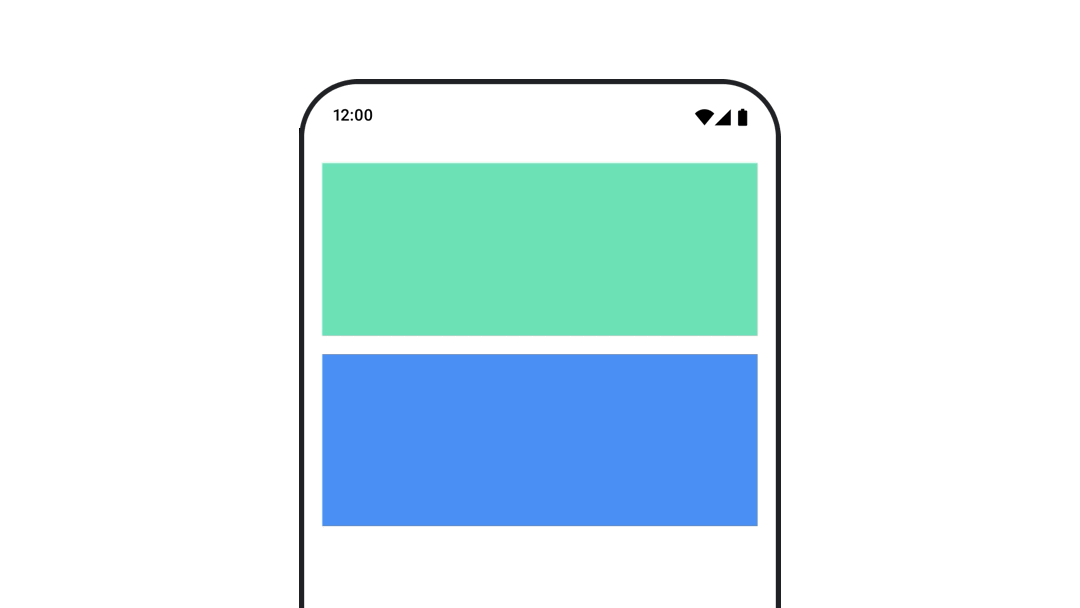
使用 AnimatedVisibility 隐藏或显示可组合项。AnimatedVisibility 中的子项可以使用 Modifier.animateEnterExit() 来实现自己的进入或退出过渡。
var visible by remember { mutableStateOf(true) } // Animated visibility will eventually remove the item from the composition once the animation has finished. AnimatedVisibility(visible) { // your composable here // ... }
通过 AnimatedVisibility 的进入和退出参数,您可以配置可组合项在显示和消失时的行为。如需了解详情,请参阅完整文档。
另一种为可组合项的可见性添加动画效果的方法是使用 animateFloatAsState 随时间推移为 Alpha 添加动画效果:
var visible by remember { mutableStateOf(true) } val animatedAlpha by animateFloatAsState( targetValue = if (visible) 1.0f else 0f, label = "alpha" ) Box( modifier = Modifier .size(200.dp) .graphicsLayer { alpha = animatedAlpha } .clip(RoundedCornerShape(8.dp)) .background(colorGreen) .align(Alignment.TopCenter) ) { }
不过,更改 Alpha 值时需要注意,可组合函数仍会保留在组合中,并继续占用其布局空间。这可能会导致屏幕阅读器和其他无障碍机制仍将该项视为在屏幕上。另一方面,AnimatedVisibility 最终会从组合中移除相应项。
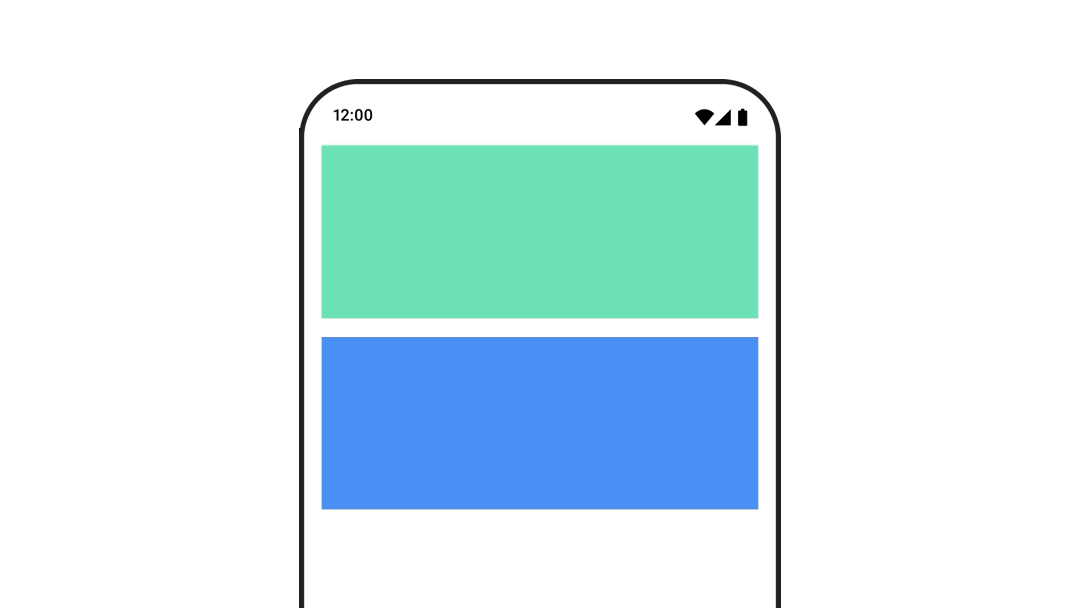
动画背景颜色
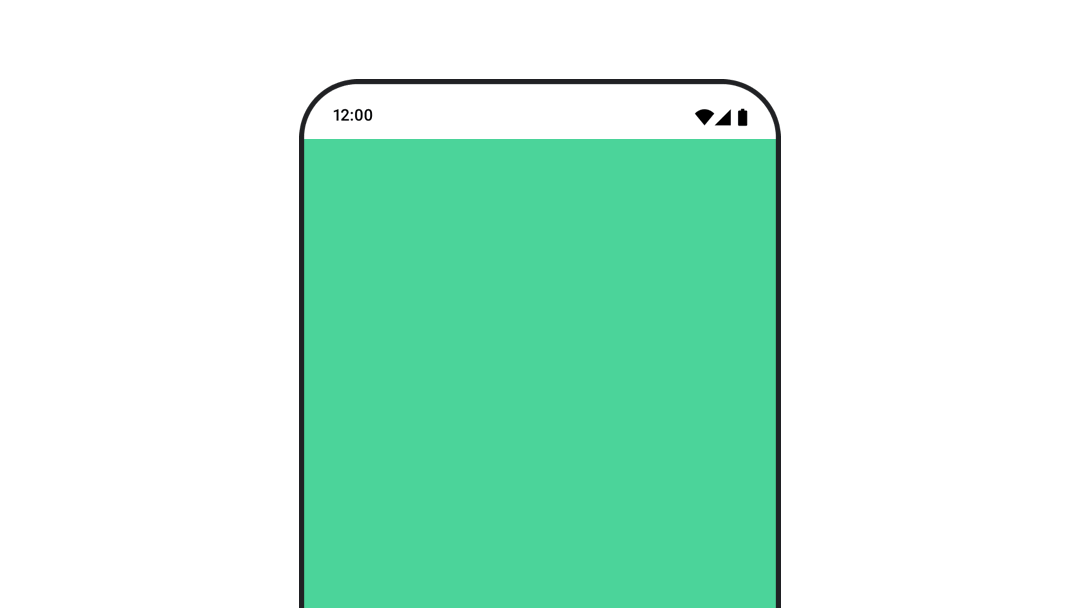
val animatedColor by animateColorAsState( if (animateBackgroundColor) colorGreen else colorBlue, label = "color" ) Column( modifier = Modifier.drawBehind { drawRect(animatedColor) } ) { // your composable here }
此选项的性能高于使用 Modifier.background()。Modifier.background() 适用于一次性颜色设置,但在随时间推移为颜色设置动画时,这可能会导致不必要的重组。
如需无限期地为背景颜色添加动画效果,请参阅重复动画部分。
为可组合项的大小设置动画效果
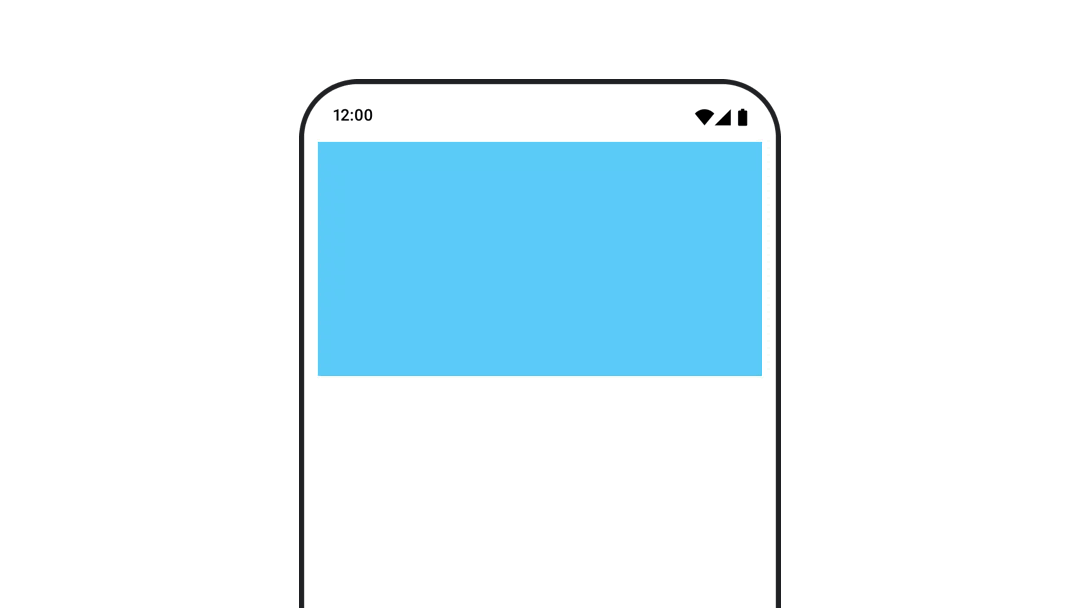
Compose 可让您通过几种不同的方式为可组合项的大小添加动画效果。使用 animateContentSize() 在可组合项大小发生变化时呈现动画效果。
例如,如果您有一个包含文本的框,该文本可以从一行扩展到多行,则可以使用 Modifier.animateContentSize() 来实现更平滑的过渡:
var expanded by remember { mutableStateOf(false) } Box( modifier = Modifier .background(colorBlue) .animateContentSize() .height(if (expanded) 400.dp else 200.dp) .fillMaxWidth() .clickable( interactionSource = remember { MutableInteractionSource() }, indication = null ) { expanded = !expanded } ) { }
您还可以使用 AnimatedContent 和 SizeTransform 来描述尺寸变化应如何发生。
为可组合项的位置添加动画效果
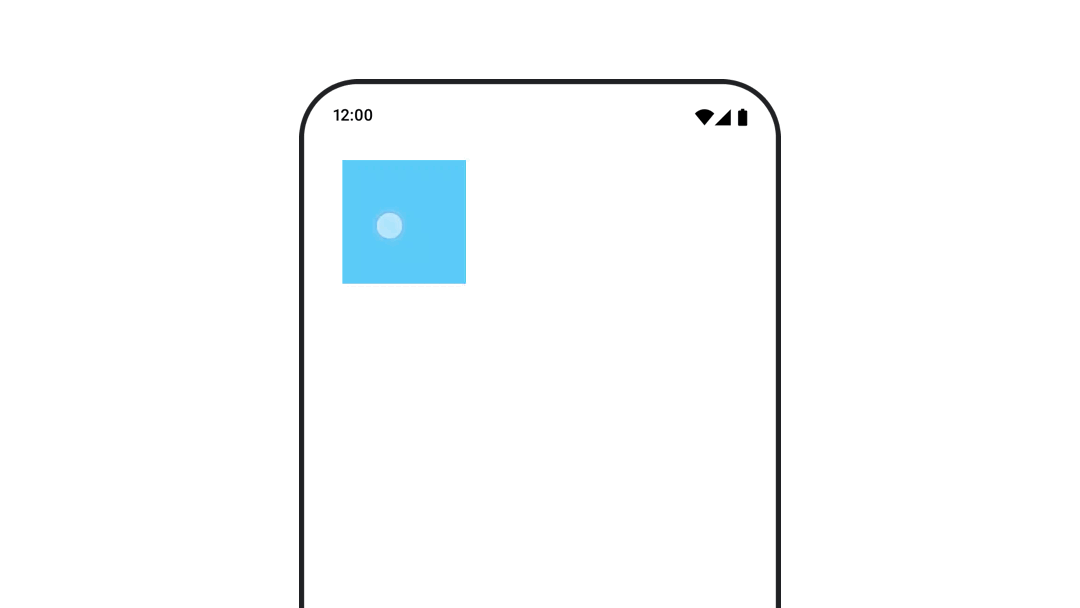
如需为可组合项的位置添加动画效果,请将 Modifier.offset{ } 与 animateIntOffsetAsState() 结合使用。
var moved by remember { mutableStateOf(false) } val pxToMove = with(LocalDensity.current) { 100.dp.toPx().roundToInt() } val offset by animateIntOffsetAsState( targetValue = if (moved) { IntOffset(pxToMove, pxToMove) } else { IntOffset.Zero }, label = "offset" ) Box( modifier = Modifier .offset { offset } .background(colorBlue) .size(100.dp) .clickable( interactionSource = remember { MutableInteractionSource() }, indication = null ) { moved = !moved } )
如果您想确保在动画显示位置或大小时,可组合项不会绘制在其他可组合项之上或之下,请使用 Modifier.layout{ }。此修饰符会将尺寸和位置更改传播给父级,进而影响其他子级。
例如,如果您要在 Column 中移动 Box,并且其他子节点需要在 Box 移动时也移动,请使用 Modifier.layout{ } 添加偏移信息,如下所示:
var toggled by remember { mutableStateOf(false) } val interactionSource = remember { MutableInteractionSource() } Column( modifier = Modifier .padding(16.dp) .fillMaxSize() .clickable(indication = null, interactionSource = interactionSource) { toggled = !toggled } ) { val offsetTarget = if (toggled) { IntOffset(150, 150) } else { IntOffset.Zero } val offset = animateIntOffsetAsState( targetValue = offsetTarget, label = "offset" ) Box( modifier = Modifier .size(100.dp) .background(colorBlue) ) Box( modifier = Modifier .layout { measurable, constraints -> val offsetValue = if (isLookingAhead) offsetTarget else offset.value val placeable = measurable.measure(constraints) layout(placeable.width + offsetValue.x, placeable.height + offsetValue.y) { placeable.placeRelative(offsetValue) } } .size(100.dp) .background(colorGreen) ) Box( modifier = Modifier .size(100.dp) .background(colorBlue) ) }
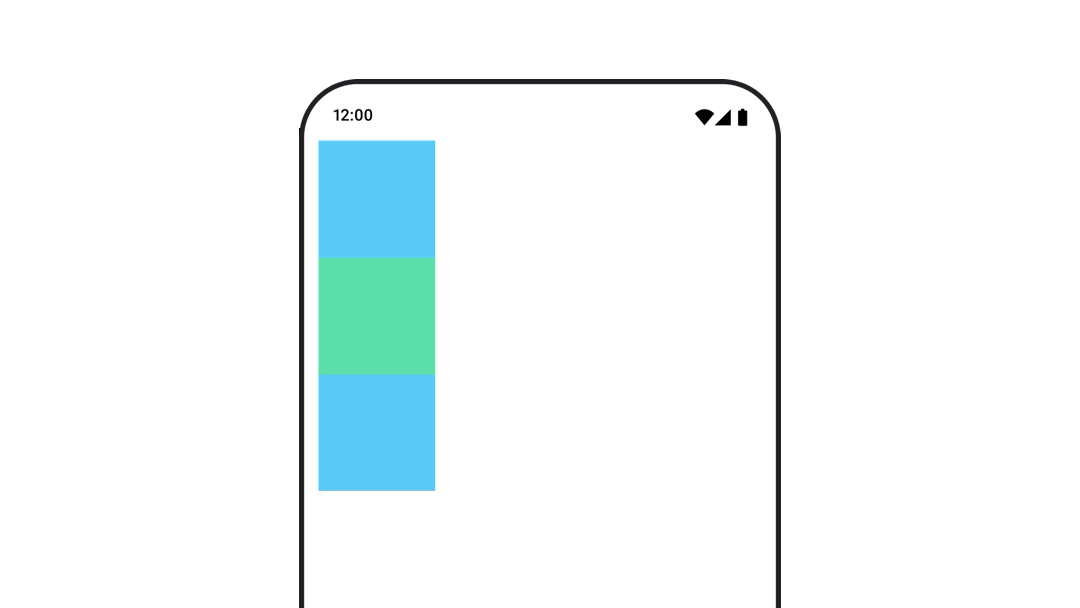
Modifier.layout{ }为可组合项的内边距添加动画效果
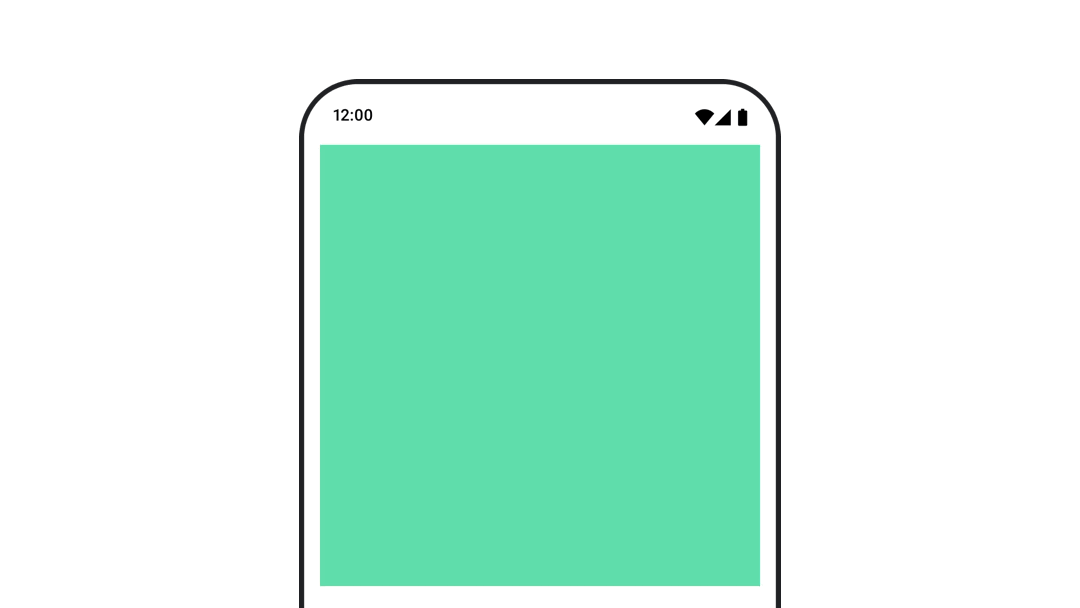
如需为可组合项的内边距添加动画效果,请将 animateDpAsState 与 Modifier.padding() 结合使用:
var toggled by remember { mutableStateOf(false) } val animatedPadding by animateDpAsState( if (toggled) { 0.dp } else { 20.dp }, label = "padding" ) Box( modifier = Modifier .aspectRatio(1f) .fillMaxSize() .padding(animatedPadding) .background(Color(0xff53D9A1)) .clickable( interactionSource = remember { MutableInteractionSource() }, indication = null ) { toggled = !toggled } )
为可组合项的高度添加动画效果
如需为可组合项的高度添加动画效果,请将 animateDpAsState 与 Modifier.graphicsLayer{ } 结合使用。对于一次性海拔变化,请使用 Modifier.shadow()。如果您要为阴影添加动画效果,使用 Modifier.graphicsLayer{ } 修饰符是性能更高的选择。
val mutableInteractionSource = remember { MutableInteractionSource() } val pressed = mutableInteractionSource.collectIsPressedAsState() val elevation = animateDpAsState( targetValue = if (pressed.value) { 32.dp } else { 8.dp }, label = "elevation" ) Box( modifier = Modifier .size(100.dp) .align(Alignment.Center) .graphicsLayer { this.shadowElevation = elevation.value.toPx() } .clickable(interactionSource = mutableInteractionSource, indication = null) { } .background(colorGreen) ) { }
或者,使用 Card 可组合项,并根据状态将升降高度属性设置为不同的值。
为文字缩放、平移或旋转添加动画效果
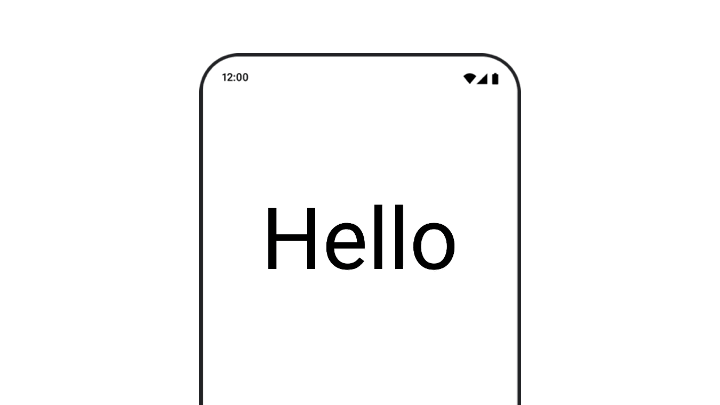
在为文字的缩放、平移或旋转设置动画效果时,请将 TextStyle 上 textMotion 参数设置为 TextMotion.Animated。这可确保文本动画之间的过渡更加顺畅。使用 Modifier.graphicsLayer{ } 可平移、旋转或缩放文本。
val infiniteTransition = rememberInfiniteTransition(label = "infinite transition") val scale by infiniteTransition.animateFloat( initialValue = 1f, targetValue = 8f, animationSpec = infiniteRepeatable(tween(1000), RepeatMode.Reverse), label = "scale" ) Box(modifier = Modifier.fillMaxSize()) { Text( text = "Hello", modifier = Modifier .graphicsLayer { scaleX = scale scaleY = scale transformOrigin = TransformOrigin.Center } .align(Alignment.Center), // Text composable does not take TextMotion as a parameter. // Provide it via style argument but make sure that we are copying from current theme style = LocalTextStyle.current.copy(textMotion = TextMotion.Animated) ) }
为文字颜色添加动画效果
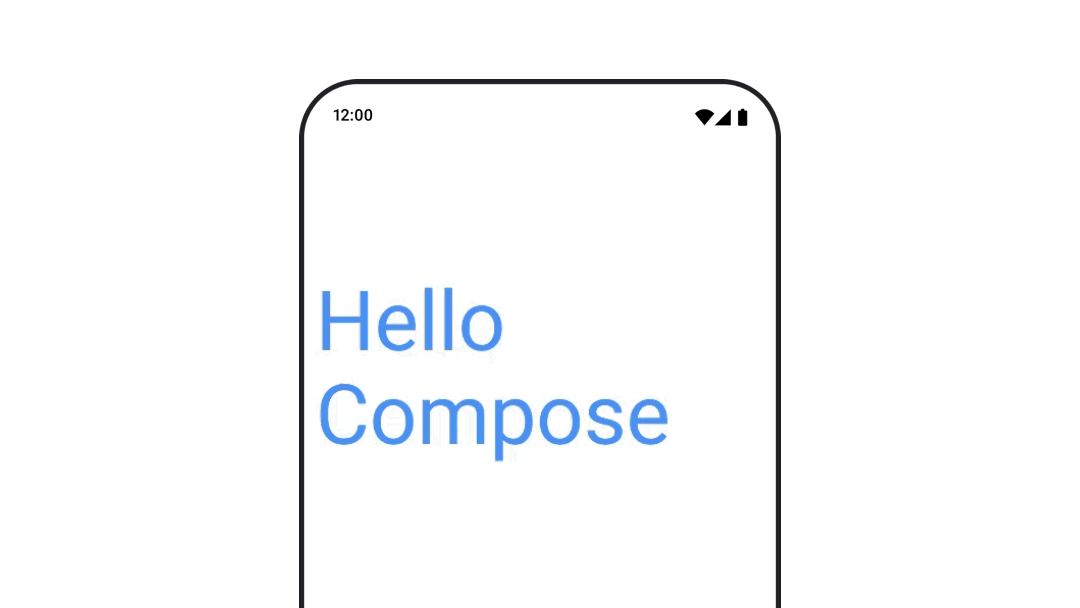
如需为文字颜色添加动画效果,请在 BasicText 可组合函数中使用 color lambda:
val infiniteTransition = rememberInfiniteTransition(label = "infinite transition") val animatedColor by infiniteTransition.animateColor( initialValue = Color(0xFF60DDAD), targetValue = Color(0xFF4285F4), animationSpec = infiniteRepeatable(tween(1000), RepeatMode.Reverse), label = "color" ) BasicText( text = "Hello Compose", color = { animatedColor }, // ... )
在不同类型的内容之间切换
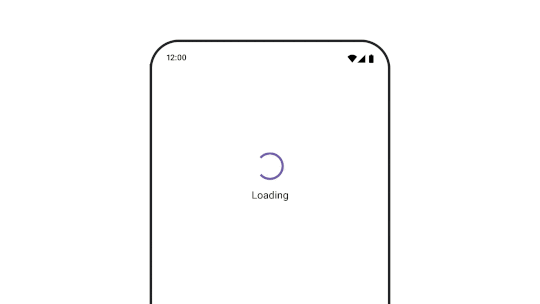
使用 AnimatedContent 可在不同的可组合项之间添加动画效果;如果您只是想在可组合项之间添加标准的淡入淡出效果,请使用 Crossfade。
var state by remember { mutableStateOf(UiState.Loading) } AnimatedContent( state, transitionSpec = { fadeIn( animationSpec = tween(3000) ) togetherWith fadeOut(animationSpec = tween(3000)) }, modifier = Modifier.clickable( interactionSource = remember { MutableInteractionSource() }, indication = null ) { state = when (state) { UiState.Loading -> UiState.Loaded UiState.Loaded -> UiState.Error UiState.Error -> UiState.Loading } }, label = "Animated Content" ) { targetState -> when (targetState) { UiState.Loading -> { LoadingScreen() } UiState.Loaded -> { LoadedScreen() } UiState.Error -> { ErrorScreen() } } }
AnimatedContent 可进行自定义,以显示多种不同的进入和退出过渡效果。如需了解详情,请参阅有关 AnimatedContent 的文档,或阅读这篇关于 AnimatedContent 的博文。
在前往不同目的地的导航过程中添加动画
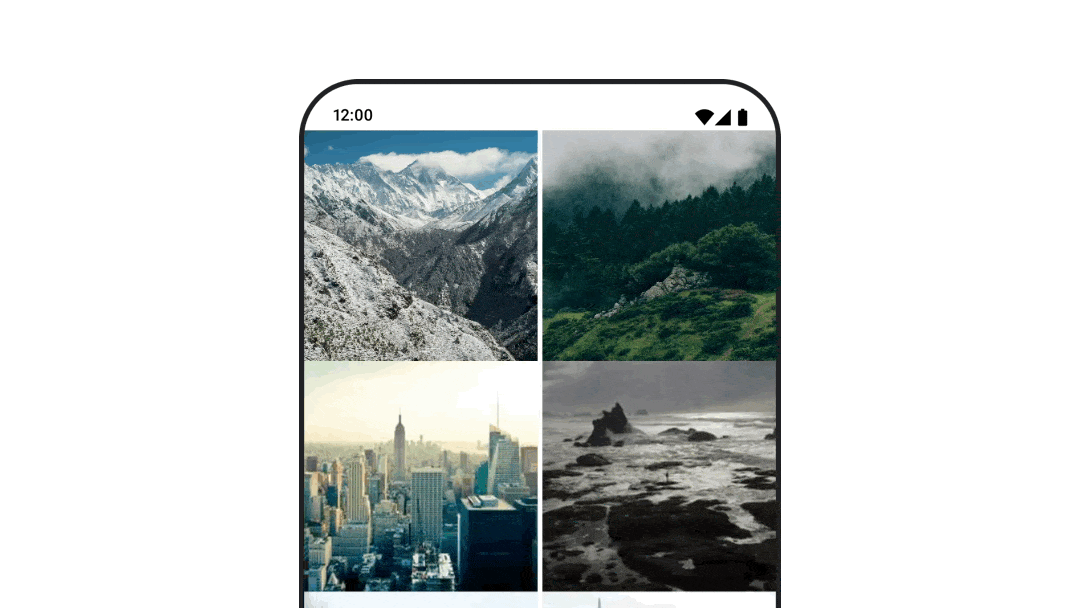
使用 navigation-compose 制品集时,如需在可组合项之间添加动画过渡效果,请在可组合项上指定 enterTransition 和 exitTransition。您还可以将默认动画设置为用于顶层 NavHost 的所有目的地:
val navController = rememberNavController() NavHost( navController = navController, startDestination = "landing", enterTransition = { EnterTransition.None }, exitTransition = { ExitTransition.None } ) { composable("landing") { ScreenLanding( // ... ) } composable( "detail/{photoUrl}", arguments = listOf(navArgument("photoUrl") { type = NavType.StringType }), enterTransition = { fadeIn( animationSpec = tween( 300, easing = LinearEasing ) ) + slideIntoContainer( animationSpec = tween(300, easing = EaseIn), towards = AnimatedContentTransitionScope.SlideDirection.Start ) }, exitTransition = { fadeOut( animationSpec = tween( 300, easing = LinearEasing ) ) + slideOutOfContainer( animationSpec = tween(300, easing = EaseOut), towards = AnimatedContentTransitionScope.SlideDirection.End ) } ) { backStackEntry -> ScreenDetails( // ... ) } }
有许多不同的进入和退出过渡效果,可为传入和传出的内容应用不同的效果,如需了解详情,请参阅文档。
重复播放动画

将 rememberInfiniteTransition 与 infiniteRepeatable
animationSpec 搭配使用,可让动画不断重复播放。更改 RepeatModes 以指定其应如何来回移动。
使用 repeatable 可重复执行指定次数。
val infiniteTransition = rememberInfiniteTransition(label = "infinite") val color by infiniteTransition.animateColor( initialValue = Color.Green, targetValue = Color.Blue, animationSpec = infiniteRepeatable( animation = tween(1000, easing = LinearEasing), repeatMode = RepeatMode.Reverse ), label = "color" ) Column( modifier = Modifier.drawBehind { drawRect(color) } ) { // your composable here }
在启动可组合项时启动动画
当可组合项进入组合时,LaunchedEffect 会运行。它会在启动可组合项时启动动画,您可以使用它来驱动动画状态变化。使用 Animatable 和 animateTo 方法在启动时开始动画:
val alphaAnimation = remember { Animatable(0f) } LaunchedEffect(Unit) { alphaAnimation.animateTo(1f) } Box( modifier = Modifier.graphicsLayer { alpha = alphaAnimation.value } )
创建连续动画
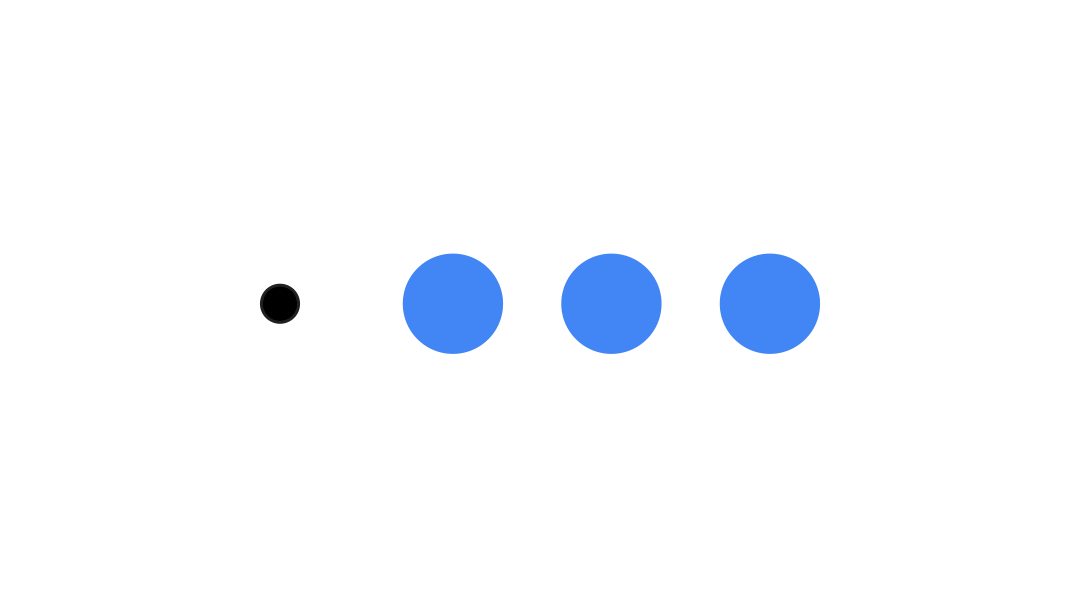
使用 Animatable 协程 API 可执行顺序动画或并发动画。在 Animatable 上依次调用 animateTo 会导致每个动画在继续之前等待之前的动画完成。这是因为该函数是一个挂起函数。
val alphaAnimation = remember { Animatable(0f) } val yAnimation = remember { Animatable(0f) } LaunchedEffect("animationKey") { alphaAnimation.animateTo(1f) yAnimation.animateTo(100f) yAnimation.animateTo(500f, animationSpec = tween(100)) }
创建并发动画
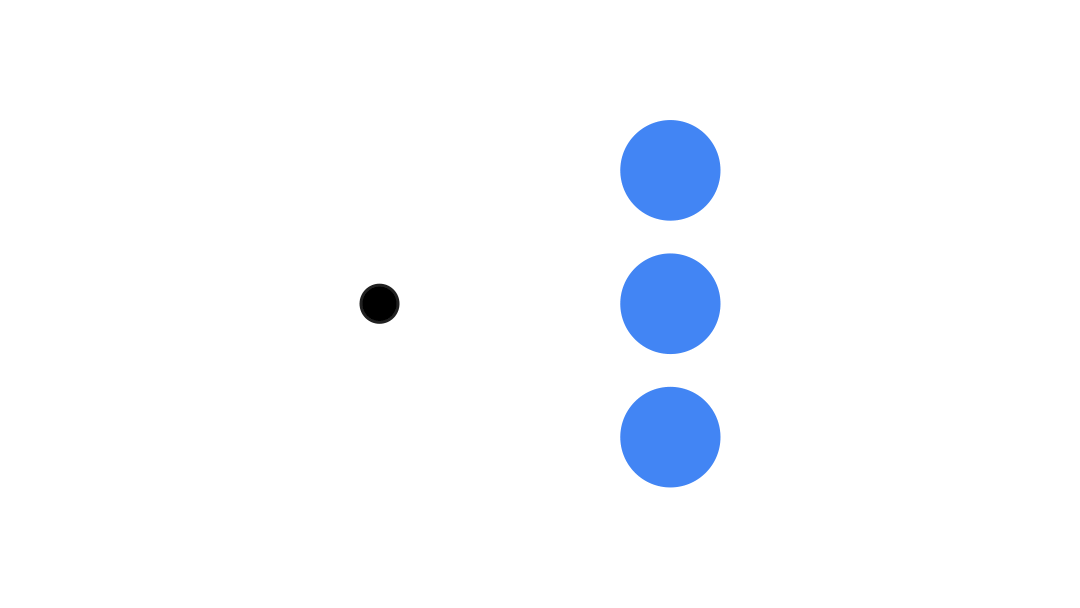
使用协程 API(Animatable#animateTo() 或 animate)或 Transition API 来实现并发动画。如果您在协程上下文中使用多个启动函数,则会同时启动动画:
val alphaAnimation = remember { Animatable(0f) } val yAnimation = remember { Animatable(0f) } LaunchedEffect("animationKey") { launch { alphaAnimation.animateTo(1f) } launch { yAnimation.animateTo(100f) } }
您可以使用 updateTransition API 同时使用同一状态来驱动许多不同的属性动画。以下示例为由状态变化控制的两个属性(rect 和 borderWidth)添加动画:
var currentState by remember { mutableStateOf(BoxState.Collapsed) } val transition = updateTransition(currentState, label = "transition") val rect by transition.animateRect(label = "rect") { state -> when (state) { BoxState.Collapsed -> Rect(0f, 0f, 100f, 100f) BoxState.Expanded -> Rect(100f, 100f, 300f, 300f) } } val borderWidth by transition.animateDp(label = "borderWidth") { state -> when (state) { BoxState.Collapsed -> 1.dp BoxState.Expanded -> 0.dp } }
优化动画效果
Compose 中的动画可能会导致性能问题。这是因为动画的本质是:逐帧快速移动或更改屏幕上的像素,从而营造出运动的错觉。
考虑 Compose 的不同阶段:组合、布局和绘制。如果动画更改了布局阶段,则需要所有受影响的可组合项重新布局和重绘。如果动画发生在绘制阶段,那么默认情况下,它的性能会比在布局阶段运行动画更好,因为总体上需要完成的工作更少。
为确保应用在动画播放期间尽可能少地执行操作,请尽可能选择 Modifier 的 lambda 版本。这会跳过重组并在组合阶段之外执行动画,否则请使用 Modifier.graphicsLayer{ },因为此修饰符始终在绘制阶段运行。如需详细了解此方面的信息,请参阅性能文档中的延迟读取部分。
更改动画时间设置
默认情况下,Compose 会为大多数动画使用弹簧动画。弹簧动画(即基于物理特性的动画)感觉更自然。它们也是可中断的,因为它们会考虑对象的当前速度,而不是固定的时间。如果您想替换默认设置,上述所有动画 API 都可以设置 animationSpec 来自定义动画的运行方式,无论您希望动画在特定时长内执行还是更具弹性。
以下是不同 animationSpec 选项的摘要:
spring:基于物理特性的动画,所有动画的默认类型。您可以更改刚度或 dampingRatio,以实现不同的动画外观和风格。tween(介于的缩写):基于时长的动画,使用Easing函数在两个值之间添加动画效果。keyframes:用于在动画中的特定关键点指定值的规范。repeatable:基于时长的规范,运行次数由RepeatMode指定。infiniteRepeatable:基于时长的规范,可无限期运行。snap:立即跳到最终值,没有任何动画效果。
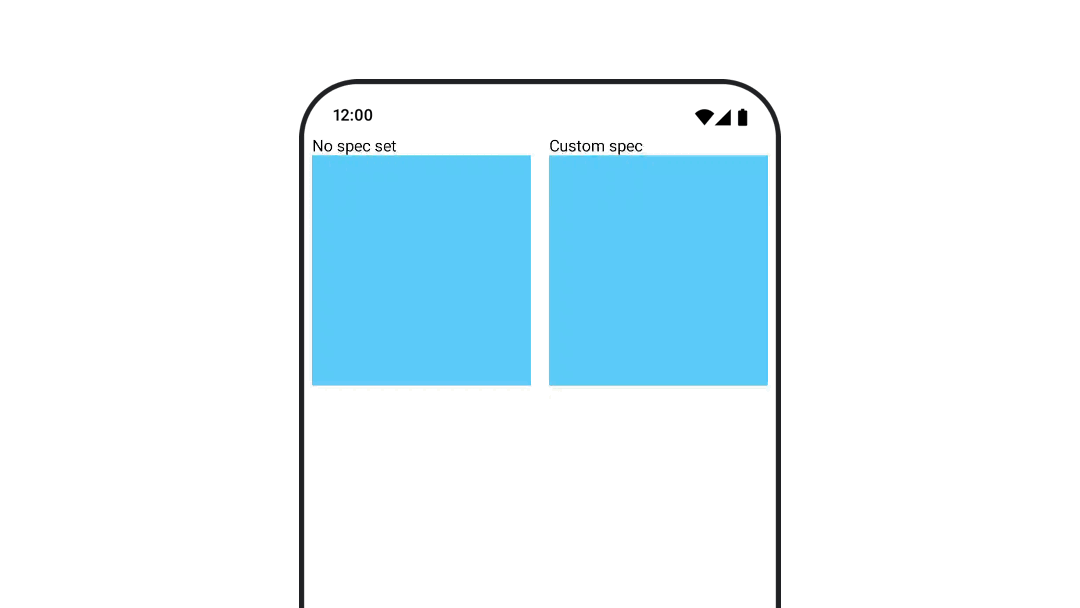
如需详细了解 animationSpec,请参阅完整文档。
其他资源
如需查看更多有趣的 Compose 动画示例,请参阅以下内容:

